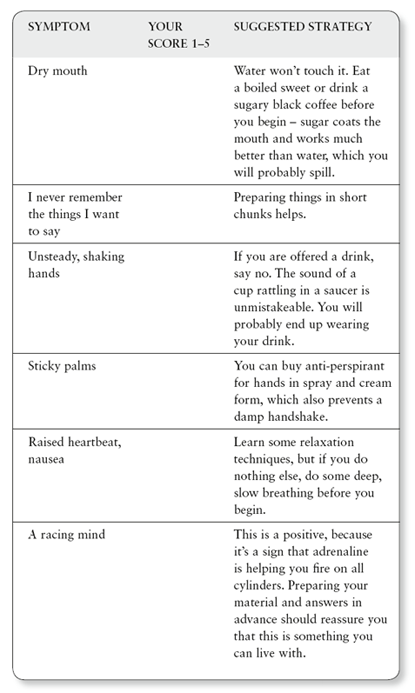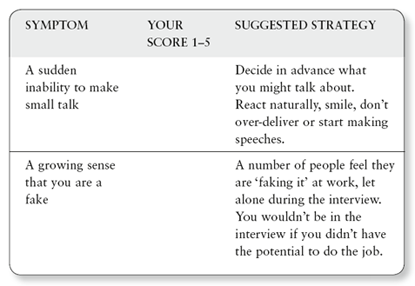Handling interview nerves
THIS CHAPTER LOOKS AT:
- Ways that nervousness can hide your potential
- Reasons why being nervous can be helpful
- How routine advice probably won’t help
- Tips to overcome the worst of interview nerves
WHAT IF I AM (VERY) NERVOUS?
Most interview books tell you that being nervous is a good thing because it raises your attentiveness and shows that you care about the process. True enough, but no one should underestimate how nerves can block what you want to achieve at interview. Interestingly, interviewers are often nervous, too, particularly if they are working alongside someone senior or more experienced. Young people who have little experience of being interviewed are often anxious about the process (and some of them need to be more so), but interview nerves go through the age spectrum. Why? Because often an interview really matters – it can mean the difference between certainty and uncertainty, the ability to make plans, a next step that could reshape your career. Even more critically, it’s about you. Presenting a product or organisation is one thing, talking about yourself is completely different – which is why even the most senior people get nervous.
The real downside, as Rebecca Alexander of Psychologies magazine recently pointed out to me, is that fear makes us avoid thinking about the details of the process. Candidates do better if they picture themselves in each stage of a selection process, visualising how they will behave. This is not done as frequently as it should be, but is a great way of anticipating the demands of the process ahead and planning how you will be, as well as what you will say. However, for many people, visualising what will happen can make them feel even more anxious, so they hide from what is coming and miss a powerful way to prepare for a great interview.
For some people just being asked to speak in an interview is an ordeal. Take comfort from the fact that a large number of accomplished performers – public speakers, business leaders, actors – are secretly terrified. Sir Laurence Olivier, even at the height of his career, used to be physically sick before he walked on stage.
SYMPTOMS THAT GET IN THE WAY
Even the most experienced professionals can experience the following symptoms:
- A mouth that becomes so dry you can hardly speak.
- Worrying that you will not remember the things you need to say.
- A sudden inability to make small talk.
- Unsteady, shaking hands, sticky palms, raised heartbeat, nausea.
- A racing mind which prevents you hearing the questions asked.
- Saying too much about the wrong things, or too little about what matters.
- Clumsiness – the ability to knock over anything in range.
- A feeling that everything you say ‘comes out wrong’.
- Difficulties reading your notes or recollecting examples under pressure.
- Difficulty talking positively about yourself.
- A growing sense that you are a fake.
These are real symptoms and not to be dismissed or overcome easily. They arise from a very old part of the human brain which governs primordial responses like blushing, heartbeat and breathing – those times when your body takes over no matter how hard you concentrate. Remember that fear fires up adrenaline, which also improves your performance, so in a way you can welcome the symptoms, because they are a clear sign that your brain is kicking into gear.
MANAGING INTERVIEW NERVES
There isn’t a magic bullet, but there are things you can do. Start by taking a gradual approach, dealing with one worry at a time and learning from a few tried and tested strategies. Look at the list below, and also write down any additional symptoms you experience under interview pressure. Now score each item from 1 (not too worrying) to 5 (this really gets in the way), then think about what you can do to improve the situation. Tip: start on the number 1 scores first – start to teach your unconscious brain a few lessons about managing under pressure.
‘JUST BE YOURSELF’
This is the advice you will probably hear before every interview. How irritating that phrase is, failing to acknowledge how vulnerable you feel when someone turns the spotlight on you. Not only that, it’s frustratingly difficult to achieve. As if there was a switch in your head marked ‘myself – On/Off’. It’s well-meant advice, but almost meaningless. We are different selves in different areas of our lives – when we are with partners, family, close friends, in public, with colleagues, with the boss. Which ‘myself’ are you supposed to be?
The self you reveal at interview will always be a slightly more anxious, restrained, cautious version of you, and it’s misleading to pretend otherwise. And interviewers realise this. They know that the person they meet in the interview is not an exact replica of the way you will be at work. It’s their job to get you to disclose enough of yourself to make a selection decision. So, while you can’t just ‘be yourself’, it is your job to give them enough to show them a positive version of yourself as the right choice for the job.
How?
- Get help from a coach or from friends to capture that person – you on a good day. What puts you in the right frame of mind to be that kind of person? For some people, rediscovering this energised, alternative ‘you’ just before an interview can make a huge difference.
- Do whatever you need to do (see Chapter 6) to be a switched on, positive, attentive but slightly anxious version of you. That will work just fine.
- As daunting as it is to anticipate questions, having a ready bank of evidence builds confidence considerably.
- Warm up mentally by thinking and talking about positive things in the 30 minutes before an interview; you’ll find it makes an enormous difference to your state of mind, especially if you are a modest, slow starter.
Remember, all you are trying to do is allow an interviewer enough glimpses to imagine you in the job. You don’t have to totally defeat your nerves to achieve this, just distract them for a while, and kid them into allowing you to reveal an employable self.
‘JUST RELAX’
This is the second most irritating piece of advice. You hear the same from the dentist just as he reaches for something sharp. You are, of course, the opposite of relaxed, so it’s rather like saying ‘don’t look down’ at the top of a skyscraper.
The phrase is also used, misleadingly, when interviewers say ‘relax – it’s just a chat’. Whether it’s lunch, coffee or an ‘informal’ discussion, it’s always an interview, and you should always prepare as if it is.
However, when someone says ‘relax’, what you should hear is ‘make my job easier’. An interviewer needs to get you to disclose information, some of it relatively personal. If you disclose the right things in the right way, it’s difficult not to get a result. So smile and breathe deeply, because you’re trying to help someone do their job.
For some people who display more than half a dozen of the nervousness symptoms outlined above, it pays to learn some kind of relaxation system such as relaxation tapes, relieving muscle tension, or meditation. There are as many ways of doing this as there are nervous interviewees, but the interesting thing is that you probably already know what works for you, and you avoid doing it because that means getting to grips with the problem.
START FROM STILLNESS
Do you look agitated or calm at the beginning of an interview? Look at politicians. The ones who are trusted the most are often the ones with gravitas – that old-fashioned word which describes a calm, dignified presence. They begin an interview sitting straight, looking attentive rather than formally stiff. They look around slowly at what is going on in the room, weighing things up. Even though they may be nervous, they don’t look it because their body movements are slow and controlled. When asked a question, they respond in a measured, clear way rather than rushing into the answer. As they speak, they command attention and ‘hold the floor’ for a few moments. Their answer ends audibly, too – you can almost hear the full stop.
Work towards an interview presence which begins in stillness – particularly important if you are slightly agitated, fidgeting or pulling at your collar or hemline, perhaps talking too fast. Practise sitting. Sit in a position which is comfortable but where your balance is tipped slightly forward, with one foot slightly forward of the other, exactly as you would if you were holding yourself ready to stand quickly in one smooth movement. Keep your hands still by holding a document folder. Look forward, and release any tension in your neck and shoulders. Breathe in slowly and gently, for longer than you would do normally, and release your breath slowly. This technique will improve the strength and depth of your voice (both factors which impress) as well as relaxing you.
Listen, too. Listen to the volume that other people speak at, because this is the best clue you’ll get about your own delivery volume.
Sitting and breathing and listening – is that it? It also helps if you can do something to still the racing mind at the same time. Breathing is often enough, but if you have some other meditative technique that helps you be still mentally as well as physically, use it now. It might be a repeated phrase like ‘calm, calm, calm’. It might be visualising a place and time when you were quietly happy. Be still, and wait for the first question.
This is where you come to life, but in a controlled way. Rather than talking too much, not listening to the question and constantly going off at a tangent, your answer will be energised, but also focused. Answer clearly, audibly, with evident interest in the question, and be confident that as a result of your preparation your answer is going in the right direction.




